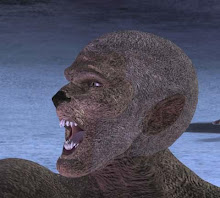National Geographic Channel - Original Broadcast Date: Unknown
Nat Geo's supernatural shows are generally more skeptical than other similar shows, and this one is no exception. After a bit of background - including the Doug & Dave story -- Skeptics and believers line up on either side of the crop circle phenomenon, and present their arguments. The "Julia Set" circle supposedly appeared near Stonehenge in broad daylight. Professor Christopher French (at the University of London), who specializes in the psychology of the paranormal, believes that a desire to believe distorts the perceptions of believers. He points out that the stories about the discovery of the circle are inconsistent, and tests show that task fixation - inattentional blindness -- can make people miss seemingly obvious objects or events. They show an attention-testing video where people who are asked to concentrate on counting bouncing balls miss a pilot walking through the scene. Other believers claim that the complex crop patterns cannot be made by humans. (And clearly they've never seen a Wisconsin corn maze in the shape of the US, either.) To see if this is true, a mathematician draws a complex pattern and challenges human circle makers led by John Lundberg to duplicate it. The group does, and they do it on a night with only 4 hours of darkness. (Lundberg, an artist, sees the crop cricle "researchers" as publicity agents for his art.)
Believers cite appearances of supernatural balls of light, orbs, that accompany circles. The show recaps the 1996 John Wade orb circle creation hoax, which some still believe - and even claim it would be hard to replicate. But the show recreates the fake video with software comparable to what hoaxer Wade used in just a couple of hours. Next, the show tackles the claim that nitrate and radiation levels in crop circles are higher than in other places. Testing the man-made circle vs. a supposed real one, a scientist finds no difference in either area. He also mentions that trace radiation from natural and man-made sources is common, and fertilizers contain nitrates. He concludes that all crop circles are likely made by people. So, what about the "personal experiences" of the supernatural and sacred that people have in the circles? One man describes the circles as "temporary temples." An experiment with crystals that subjects are told may cause strange sensations, 80+% report the expected experiences -- though the "crystals" are merely cut glass. The power of suggestibility is strong, and people will often find what they are looking for. Certainly, with crop circles, this seems to be the case.
Wednesday, June 16, 2010
Subscribe to:
Post Comments (Atom)





No comments:
Post a Comment